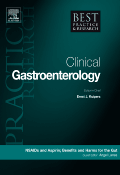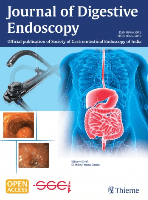
DEN Open
Scope & Guideline
Empowering innovation in healthcare research.
Introduction
Aims and Scopes
- Gastrointestinal Endoscopy Techniques:
The journal emphasizes the development and refinement of endoscopic techniques, including endoscopic submucosal dissection (ESD), endoscopic retrograde cholangiopancreatography (ERCP), and other minimally invasive procedures that enhance patient outcomes. - Clinical Case Studies and Reports:
DEN Open publishes detailed case reports that contribute to understanding rare or complex gastrointestinal conditions, providing insights into clinical management and treatment efficacy. - Innovative Imaging and Diagnostic Tools:
Research on advanced imaging techniques, such as image-enhanced endoscopy and artificial intelligence applications, is a core focus, aiming to improve diagnostic accuracy and procedural safety. - Interventional Endoscopy:
The journal covers studies on interventional procedures, including stenting, drainage techniques, and the management of complications arising from endoscopic interventions. - Multidisciplinary Approaches:
DEN Open promotes a multidisciplinary perspective by integrating insights from gastroenterology, surgery, radiology, and pathology to enhance the understanding and management of gastrointestinal diseases.
Trending and Emerging
- Artificial Intelligence in Endoscopy:
The increasing integration of artificial intelligence (AI) in diagnostic processes and procedural assistance marks a significant trend, as studies explore AI's role in enhancing diagnostic accuracy and efficiency. - Advanced Imaging Techniques:
Emerging research on novel imaging modalities, such as virtual scale endoscopy and enhanced color imaging, indicates a growing emphasis on improving visualization and diagnostic capabilities during endoscopic procedures. - Patient Safety and Quality Improvement:
There is a notable trend towards prioritizing patient safety, evidenced by studies focusing on infection control measures, procedural safety, and the impact of training on outcomes. - Management of Complications:
An increasing number of publications addressing the management of complications related to endoscopic procedures demonstrates a proactive approach to enhancing patient care and outcomes. - Telemedicine and Remote Consultations:
The rise of telemedicine, particularly in the context of the COVID-19 pandemic, has led to an emerging focus on remote consultations and follow-up care in gastrointestinal endoscopy.
Declining or Waning
- Traditional Surgical Approaches:
There is a noticeable decline in research focused on traditional surgical methods in favor of minimally invasive endoscopic techniques, indicating a shift towards less invasive treatment modalities that prioritize patient recovery. - General Endoscopy Training:
Research relating to general training protocols for endoscopy has become less frequent, possibly overshadowed by more specialized studies that focus on advanced techniques and procedural innovations. - Single-Center Studies:
There is a waning interest in single-center studies, as multicenter collaborations and larger cohort studies gain more traction, providing broader insights and more generalizable findings.
Similar Journals

Clinical Gastroenterology and Hepatology
Bridging Science and Practice in Digestive HealthClinical Gastroenterology and Hepatology, published by Elsevier Science Inc, stands as a leading journal in the fields of gastroenterology and hepatology. With an ISSN of 1542-3565 and an E-ISSN of 1542-7714, this esteemed publication has earned its place in the top quartile (Q1) of both gastroenterology and hepatology categories as of 2023, ranking 6th out of 167 and 7th out of 82 respectively. The journal aims to disseminate innovative research, clinical studies, and case reports that advance the understanding and treatment of gastrointestinal and liver diseases. Targeted towards researchers, healthcare professionals, and students, it provides crucial insights into emerging therapies and medical advancements. Clinical Gastroenterology and Hepatology is not only a pivotal resource for contemporary gastroenterological research but also fosters collaboration and knowledge-sharing within the medical community. With a converging publication history from 2003 to the present, the journal continues to build on its solid foundation of scientific excellence and relevance.

Best Practice & Research Clinical Gastroenterology
Empowering Clinicians with High-Impact Gastroenterology ResearchBest Practice & Research Clinical Gastroenterology is a leading journal in the field of gastroenterology, published by Elsevier Science Ltd, that aims to disseminate high-quality research and evidence-based guidelines for clinical practice. With an impressive impact factor and ranked in the top tier (Q1) of gastroenterology journals as per Scopus, it is recognized for its critical role in advancing knowledge and best practices in clinical settings. The journal is published biannually with content that spans a wide array of topics affecting the gastrointestinal tract, and it encourages contributions from researchers and professionals who seek to enhance their understanding and improve patient care. It's accessible in both subscription and open access formats, allowing for a broad audience engagement and dissemination of pivotal research findings. Since its inception in 1999, Best Practice & Research Clinical Gastroenterology has served as a vital resource for clinicians and academics alike, contributing significantly to improvements in gastroenterological health.

Digestive Endoscopy
Pioneering Insights in Digestive EndoscopyDigestive Endoscopy is a premier journal dedicated to publishing high-quality research in the fields of gastroenterology and radiology. Published by WILEY, this esteemed journal has established itself as a vital resource since its inception in 1989, continuing to thrive in its pursuit of advancing knowledge and practice in digestive health. With an impressive impact factor reflected by its Q1 ranking in both Gastroenterology and Radiology, Nuclear Medicine and Imaging, Digestive Endoscopy stands out as a crucial platform for researchers, practitioners, and students alike. The journal's commitment to disseminating cutting-edge findings and its strategic goal to enhance clinical practice make it indispensable for those engaged in these dynamic fields. While Open Access options are not currently available, the journal remains widely accessible through institutional subscriptions and various research databases. The Scopus rankings further underscore its significance, placing it in the top tiers of its categories, highlighting its influence and the relevance of its contributions to the global medical community.

Journal of Digestive Endoscopy
Transforming Insights into Digestive CareJournal of Digestive Endoscopy is a premier academic journal published by THIEME MEDICAL PUBL INC, focusing on the rapid advancements and innovative techniques in the field of digestive endoscopy. Established as an Open Access platform since 2011, this journal aims to disseminate high-quality research, reviews, and clinical studies that contribute to the understanding and improvement of digestive health. Featuring a broad spectrum of topics ranging from diagnostic procedures to therapeutic interventions, the journal serves as an essential resource for researchers, clinicians, and students alike who seek to enhance patient outcomes and advance their knowledge in gastroenterology. With its commitment to accessibility and academic rigor, the Journal of Digestive Endoscopy plays a vital role in fostering collaboration and innovation within the scientific community.

BMC GASTROENTEROLOGY
Elevating Understanding of Gastrointestinal Disorders GloballyBMC Gastroenterology is a premier open-access journal published by BMC, dedicated to disseminating high-quality research in the field of gastroenterology. Established in 2001 and headquartered in the United Kingdom, this journal aims to enhance the understanding of gastrointestinal disorders through innovative research, reviews, and clinical studies. With an impressive impact factor and ranking within the Q2 category in gastroenterology and miscellaneous medicine for 2023, BMC Gastroenterology plays a critical role in advancing knowledge and practices in the field. The journal's commitment to open access ensures that researchers, professionals, and students worldwide can freely access and share vital findings and insights. Encouraging collaboration and knowledge transfer, BMC Gastroenterology is an essential resource for those dedicated to improving gastrointestinal health and outcomes.

ACG Case Reports Journal
Advancing Gastrointestinal Knowledge Through Real-World InsightsACG Case Reports Journal, published by Lippincott Williams & Wilkins, is a pivotal resource in the realm of gastrointestinal medicine and clinical practice. Since its inception in 2014, this open-access journal has dedicated itself to disseminating high-quality case reports that contribute to the evolving understanding of gastrointestinal diseases and their management. With an impressive ranking of #203 out of 529 in the General Medicine category according to Scopus, placing it in the 61st percentile, the journal underscores its significant role in advancing medical knowledge. This accessibility allows researchers, healthcare professionals, and students to engage with groundbreaking case studies, enriching their expertise and promoting informed clinical decision-making. ACG Case Reports Journal aims to foster a collaborative environment where innovative ideas and clinical experiences converge, ultimately enhancing patient care and outcomes in the field of gastroenterology.

International Journal of Gastrointestinal Intervention
Elevating Standards in Gastroenterology ResearchInternational Journal of Gastrointestinal Intervention is a distinguished open-access journal published by the SOC GASTROINTESTINAL INTERVENTION that has been committed to disseminating critical research since its inception in 2012. Based in the Netherlands, this journal focuses on the dynamic fields of gastroenterology, hepatology, oncology, and radiology, offering a platform for innovative studies and clinical interventions that can significantly impact patient care and medical practice. With its incorporation into Scopus and ranked within the lower quartiles in various categories as of 2023, the journal acknowledges the evolving landscape of medical research and seeks to continually elevate its contributions to knowledge in these specialized areas. By embracing open access since its founding, the journal ensures that cutting-edge research findings are accessible to a global audience, fostering collaboration and knowledge sharing among researchers, professionals, and students. The journal aims to be a premier source of information and a catalyst for advancements in gastrointestinal interventions, making it an essential resource for those dedicated to improving health outcomes in these critical medical fields.

European Radiology Experimental
Fostering Global Collaboration in Radiology InnovationEuropean Radiology Experimental is a premier open-access journal published by Springer Wien, dedicated to advancing the field of radiology through innovative research and experimentation. Since its establishment in 2017, the journal has quickly gained recognition, evidenced by its impressive Q1 ranking in the Radiology, Nuclear Medicine and Imaging category, and its placement within the top 83rd percentile of the Scopus rankings. Based in the United Kingdom, this journal aims to bridge the gap between clinical practice and cutting-edge research, providing a platform for rigorous peer-reviewed articles that explore new methodologies, technologies, and insights in radiological sciences. With a commitment to open access, European Radiology Experimental ensures that its content is readily accessible to a global audience, supporting the dissemination of knowledge and fostering collaborations among researchers, professionals, and students in the medical imaging community. As it progresses through its convergence years, the journal continues to play a vital role in shaping the future of radiological research and practice.

Gastrointestinal Tumors
Transforming Discoveries into Clinical ExcellenceGastrointestinal Tumors is a reputable, peer-reviewed journal dedicated to advancing knowledge in the field of gastrointestinal oncology. Published by KARGER, this journal has been a pivotal platform since its transition to Open Access in 2014, ensuring that research findings are accessible to a global audience of researchers, clinicians, and students engaged in this vital area of study. With an emphasis on innovative research, clinical studies, and comprehensive reviews, Gastrointestinal Tumors aims to bridge gaps in knowledge and foster discussions that will inform and enhance clinical practices. The journal's commitment to excellence reflects the rising importance of gastrointestinal health in medical research, making it an essential resource for anyone seeking to stay at the forefront of this rapidly evolving field. Based in Basel, Switzerland, it is positioned within a strong academic community, and continues to influence the landscape of gastrointestinal cancer research.

Techniques and Innovations in Gastrointestinal Endoscopy
Empowering Professionals with Innovative Endoscopic TechniquesTechniques and Innovations in Gastrointestinal Endoscopy, a distinguished publication by ELSEVIER SCIENCE INC, serves as a vital resource in the fields of Gastroenterology and Radiology. Established in 2020, this journal is committed to disseminating pioneering research and novel techniques that advance the practice of gastrointestinal endoscopy. With an ISSN of 2666-5107 and an E-ISSN of 2590-0307, it is positioned at the forefront of medical literature, boasting significant rankings within its categories—Q3 in Gastroenterology and Q2 in Radiology, Nuclear Medicine and Imaging as of 2023. Aimed at researchers, practitioners, and students alike, the journal highlights innovations and clinical applications, providing an open forum for the exchange of cutting-edge knowledge. Though it currently operates under a traditional access model, its growing relevance and comprehensive coverage of gastrointestinal techniques make it essential reading for professionals focused on enhancing patient outcomes through advanced endoscopic procedures.